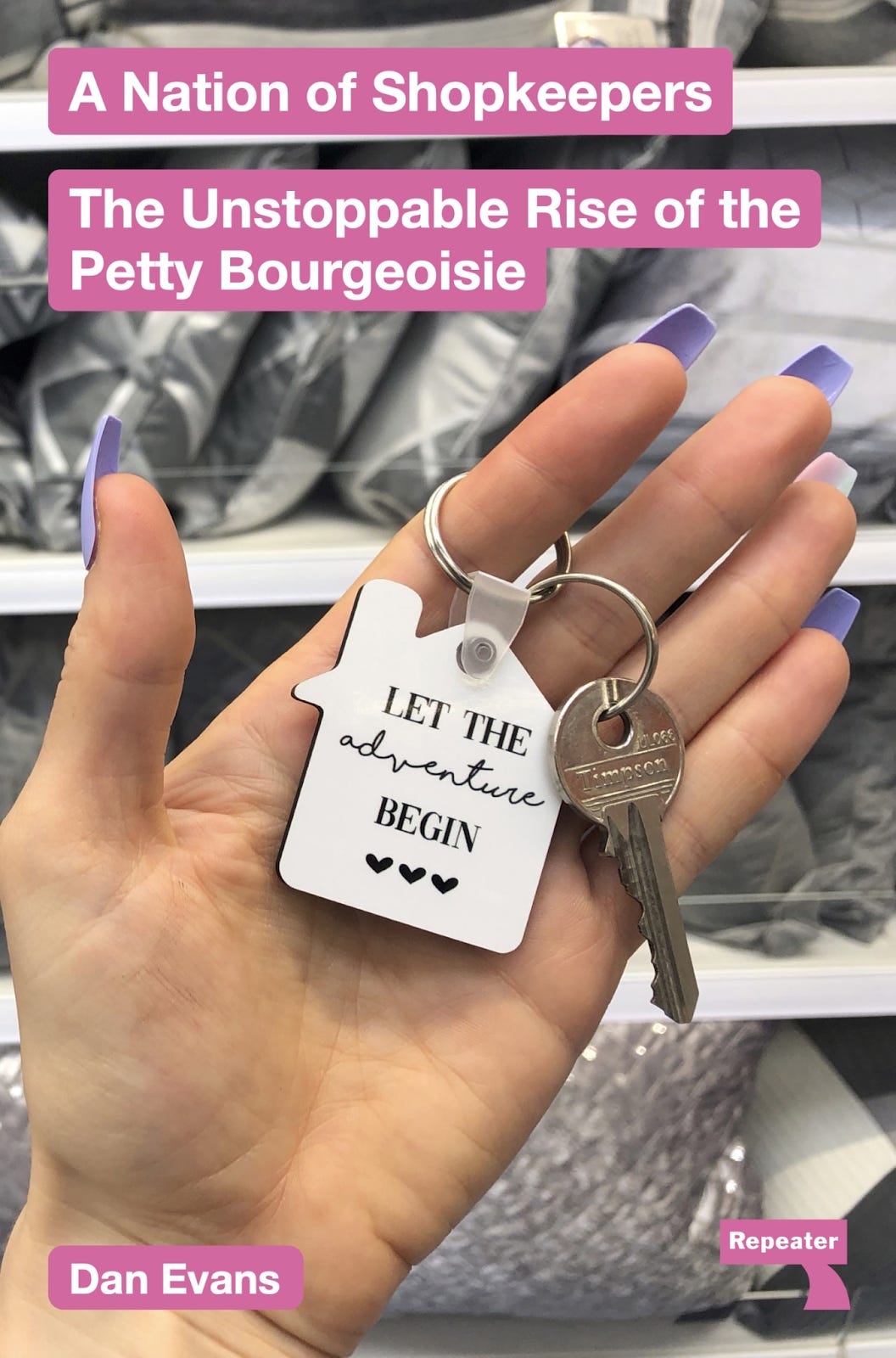Confused about class? This will help
Everyone on the internet claims to be working class, but almost everyone is wrong. A recent(ish) book shines a light on why.
Hello! Before I crack onto the topic of today, which fittingly enough is money: I am gunning for my first debased Substack milestone—the hollow orange checkmark—and need a few handfuls of people who are reading for free to sign up as paid subscribers.
I want to start by addressing the people who already pay for my work. Gorgeous, generous people. Thank you so much. I have upgraded all of you to a Founding membership, which will come with some TBD perk, to recognise your loyalty and willingness to pay full price for my writing when it mattered most.
Everyone else: I know the coin tin’s being rattled by every man and his dog at the moment, but if you’re enjoying my work, please consider upgrading so I can keep doing it! You can get 30% off forever if you click the button below before the end of June—and may I point out to my US and UK readers, which is well over a third of you, that I charge NZD, so a subscription is now ludicrously cheap in your currencies:
I have a blue-collar dad. Using this fact about my life, I could, if I wished, convince almost anyone in progressive circles I’m working class.
“My dad’s a woodturner,” I’d say to this hypothetical progressive, and while they wouldn’t quite understand the job, they’d hear “wood” and think of callused hands then bow with left-wing reverence.
I haven’t previously had any reason to do this. As a kid growing up in West Auckland in the 1990s, I never encountered left-wing reverence for the working class, so it made no sense to fake a lower station. If you were going to tell fisherman’s tales about your dad back then, you’d try to make him sound richer.
Twenty-five years later, working in digital media offices in the US, Berlin and Auckland, aglow with MacBook Airs, I noticed something strange. People were falling over themselves to stress not only that they understood the working class, but that they were part of it—including straightforwardly bourgeois people. Trust-fund babies, private school kids, people with cut-glass accents: all would speak with straight faces about their “working-class” backgrounds.

Why? In the wake of the Brexit vote and Trump I, “eat the rich” memes were in, and there was a drive in liberal media environments to start thinking seriously about class. This was a laudable goal, but the problem was, everyone’s brains were still covered in the residue of identity politics. If you were a Class Understander, you were hot property—and everyone wanted “lived experience”. Well-meaning progressives became awkwardly deferential to anyone who claimed a working-class background, as they were four years earlier to anyone brown or trans.
So there was some cachet to be found in telling fisherman’s tales about the roughness of your dad’s hands. A lot of people started pointing to temporary stints in hospo and coal-mining great-grandfathers.
But not everyone was a grifter. Many were genuinely confused. I have to work for a living, aren’t I working class by definition? If my dad was a judge but I’m a barista, where do I sit? Isn’t it just the 1% and the rest of us? Didn’t Marx say that if you own the means of production, you’re the bourgeoisie, and if you don’t, you’re a prole? Aren’t we all middle class?
I was no less confused. I knew it fudged matters significantly to say I was working class, but I’d felt like a fish out of water ever since I went to university, especially when I started working in digital media. My coworkers were my friends, but they weren’t my people. They hated polyester clothes, mass-produced dinnerware and new builds with a confusing intensity. They treated beneficiaries (AKA “bludgers”) with reverence. Their rich parents voted Labour. They knew so much about natural wine.
They claimed to love the working class, but dripped contempt for people like my dad. The feeling was mutual: bunch of pointy-heads and pinkos.
There I was, with my broad accent, polyester clothes and first-in-the-family bachelor’s degree, risen to the ranks of the pinkos. I even shared their (ostensible) politics. So what was I?
The way I set about trying to become a Class Understander circa 2016 was by reading a lot of Marx. That’s what all the serious leftists were sneering at you to do on Twitter: Ughhhh, read Marx. So I did, trudging through chapter after chapter of Capital over the course of many weekends.
But Marx isn’t the best place to start when your only experience of class is “lived” (neither, God forbid, is Twitter). It’s certainly not the best place to get a straightforward understanding of contemporary class divides.
A very good place to start if you want to understand class in the 2020s is A Nation of Shopkeepers, a thoroughly clarifying book by the Welsh sociologist, support worker, writer and trade unionist Dan Evans.
Have you noticed the scramble, in the wake of Trump, Brexit, anti-lockdown and various other populist and rebellious movements, to describe a type of person who isn’t working class (although they are routinely misclassified this way) but definitely isn’t part of the laptop or lanyard class either? In the US the term is “Chud”; in the UK, “Essex Man” and “Motorway Man”. In New Zealand, where we’re not very precise or creative, borrowed Aussie terms like “bogan” and “cooker” gesture in the same direction.
This is the traditional or “old” petty bourgeoisie, author Dan Evans clarifies: self-employed plumbers, electricians, builders and truck drivers; shopkeepers, small-scale farmers, publicans, small landlords. Aspirational people, blue-collar people, people who work with their hands. People wedged precariously between the working class and small capital. People who don’t mind polyester clothes, mass-produced dinnerware and new builds. People, in other words, like my dad.
But the petty bourgeoisie is split in two, like a double helix. The “new” petty bourgeoisie is comprised of a very different set of people: white-collar service workers, including declassed graduates, call-centre workers, teachers and teaching assistants, nurses, real estate agents and a range of other workers “clustered in the lower end of the public sector bureaucracy and in bullshit jobs in the private sector”; as well as people performing policing and disciplinary functions (police, prison guards, parking wardens, security guards, human resources). Evans includes associate professionals, noting that this is where we start shading into the border of the professional-managerial class, which I’m sure you’ve heard a lot about lately.
This second camp of the petty bourgeoisie is fascinating, and slightly harder to paint in broad strokes, especially in terms of its culture, social pastimes, behaviours, habitus, mode of dress, aesthetic preferences and so on. But long story short, there are definitely people in this camp who hate polyester clothes, mass-produced dinnerware and new builds.
This makes sense: many of them are downwardly mobile university graduates, rubbing shoulders with the professional-managerial class and bourgeoisie but occupying a more precarious economic position. How else are they supposed to differentiate themselves from the uneducated working class and especially the old petty bourgeoisie—often, dun dun dun, their families and cultures of origin?
I found this book such a gratifying read on multiple levels. It’s beautifully clarifying—even sanity restoring—on the topic of class, while at the same time acknowledging that class is complex and confusing: there are competing theories, murky borderlands, and ever-shifting historical conditions. Evans does poke some gentle fun in the early chapters at the most egregious Class Misunderstanders—including a Guardian journalist venturing bravely into the crumbling red wall to meet and examine a real working-class person, choosing as her subject a guy who owned three pizza restaurants—but he doesn’t waste time on sneering and gotchas. He just clarifies.
The book is also fascinating when it comes to rumbling tensions between classes and class fractions. The housing chapter in particular is absorbing on this front and the tensions are immediately recognisable. The self-employed Tory plumber who married his high-school sweetheart and stayed in the regions might own his own home by 30, putting him squarely ahead (in financial terms) of the downwardly mobile, Labour-voting graduate in the city. But at least she can mock his Ikea furniture and Astroturf lawn with her bourgeois friends (and help clamp down his protests).
The writing is conversational, accessible and sometimes funny. Evans isn’t much of a prose stylist; the feeling is more like being in an informal conversation with a smart, serious leftist, but not an insufferable pedant or pointy-headed bore. At the same time, there are plenty of intellectual threads to follow, with discussion of the work of Bourdieu, Nicos Poulantzas and C. Wright Mills, as well as the usual suspects (Marx, Engels, Lenin, Gramsci), and a roster of contemporary Verso leftists. I’d imagine, for most people, it’s a better place to start than deep in the bowels of Capital.
I would recommend this book even if you’re not on the left or a member of the petty bourgeoisie—and even if you’re already a Class Understander (or think you are). But especially if you’re somewhere in the murky lower-middle classes, rubbing shoulders in the workplace with people who are not quite like you, where polyester clothes and new builds are sensitive subjects, where you feel tense subterranean dynamics you can’t quite put your finger on, this book will be a light switch, I promise.
If you’ve read this book, or you read it off the back of this recommendation, please let me know! I’d love to chat more about it.
I would rather die than ask you to like and subscribe
People with self-effacing communication styles will flounder, and probably die out, in the creator economy—and the digital age more broadly.
What's so bad about being mid?
I have a painful confession: I’m responsible for not just one but two of the most viral anti-male slogans of the 2010s.









I found the passages about the unspoken sorting of kids into going to uni and not going to uni really spot on to my own experience.
I do wish he extrapolated on his points around tenants unions as I think they're a very interesting faultline between a lot of these classes (and sub classes) converge in a shared material goal sometimes
Must be a Brit thing!
Americans don’t like to admit they’re working class. Everyone claims to be middle class.
I do identify as working class. I’m certainly paid little enough.